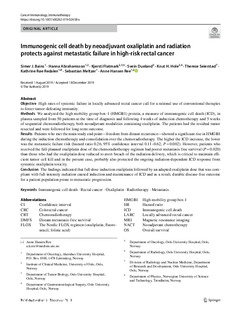| dc.contributor.author | Bains, Simer Jit | |
| dc.contributor.author | Abrahamsson, Hanna Josefine | |
| dc.contributor.author | Flatmark, Kjersti | |
| dc.contributor.author | Dueland, Svein | |
| dc.contributor.author | Hole, Knut Håkon | |
| dc.contributor.author | Seierstad, Therese | |
| dc.contributor.author | Redalen, Kathrine | |
| dc.contributor.author | Meltzer, Sebastian | |
| dc.contributor.author | Ree, Anne Hansen | |
| dc.date.accessioned | 2020-01-20T07:10:44Z | |
| dc.date.available | 2020-01-20T07:10:44Z | |
| dc.date.created | 2020-01-16T15:19:24Z | |
| dc.date.issued | 2019 | |
| dc.identifier.citation | Cancer Immunology and Immunotherapy. 2019 | nb_NO |
| dc.identifier.issn | 0340-7004 | |
| dc.identifier.uri | http://hdl.handle.net/11250/2636893 | |
| dc.description.abstract | Objective
High rates of systemic failure in locally advanced rectal cancer call for a rational use of conventional therapies to foster tumor-defeating immunity.
Methods
We analyzed the high-mobility group box-1 (HMGB1) protein, a measure of immunogenic cell death (ICD), in plasma sampled from 50 patients at the time of diagnosis and following 4 weeks of induction chemotherapy and 5 weeks of sequential chemoradiotherapy, both neoadjuvant modalities containing oxaliplatin. The patients had the residual tumor resected and were followed for long-term outcome.
Results
Patients who met the main study end point—freedom from distant recurrence—showed a significant rise in HMGB1 during the induction chemotherapy and consolidation over the chemoradiotherapy. The higher the ICD increase, the lower was the metastatic failure risk (hazard ratio 0.26, 95% confidence interval 0.11–0.62, P = 0.002). However, patients who received the full-planned oxaliplatin dose of the chemoradiotherapy regimen had poorer metastasis-free survival (P = 0.020) than those who had the oxaliplatin dose reduced to avert breach of the radiation delivery, which is critical to maintain efficient tumor cell kill and in the present case, probably also protected the ongoing radiation-dependent ICD response from systemic oxaliplatin toxicity.
Conclusion
The findings indicated that full-dose induction oxaliplatin followed by an adapted oxaliplatin dose that was compliant with full-intensity radiation caused induction and maintenance of ICD and as a result, durable disease-free outcome for a patient population prone to metastatic progression. | nb_NO |
| dc.language.iso | eng | nb_NO |
| dc.publisher | Springer | nb_NO |
| dc.rights | Navngivelse 4.0 Internasjonal | * |
| dc.rights.uri | http://creativecommons.org/licenses/by/4.0/deed.no | * |
| dc.title | Immunogenic cell death by neoadjuvant oxaliplatin and radiation protects against metastatic failure in high-risk rectal cancer. | nb_NO |
| dc.type | Journal article | nb_NO |
| dc.type | Peer reviewed | nb_NO |
| dc.description.version | publishedVersion | nb_NO |
| dc.source.journal | Cancer Immunology and Immunotherapy | nb_NO |
| dc.identifier.doi | 10.1007/s00262-019-02458-x | |
| dc.identifier.cristin | 1775098 | |
| dc.description.localcode | Open Access This article is licensed under a Creative Commons Attribution 4.0 International License, which permits use, sharing, adaptation, distribution and reproduction in any medium or format, as long as you give appropriate credit to the original author(s) and the source, provide a link to the Creative Commons licence, and indicate if changes were made. | nb_NO |
| cristin.unitcode | 194,66,20,0 | |
| cristin.unitname | Institutt for fysikk | |
| cristin.ispublished | false | |
| cristin.fulltext | postprint | |
| cristin.qualitycode | 1 | |

